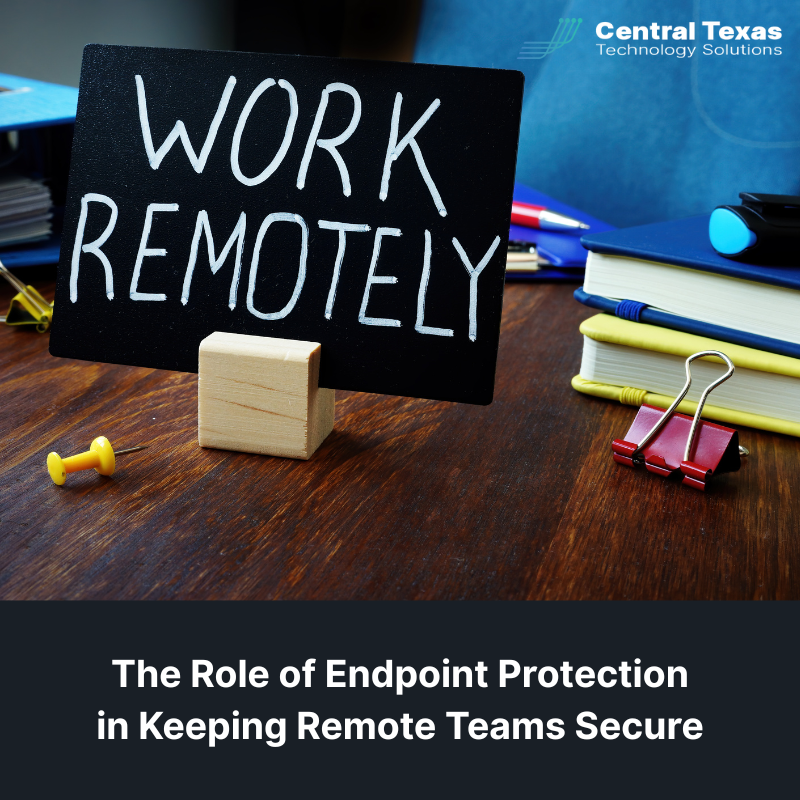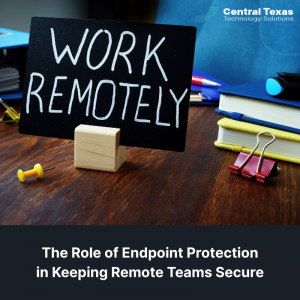
 Remote work isn’t just a trend—it’s a fundamental shift in how modern businesses operate. Whether you're managing a legal team in Austin, running a nonprofit in Round Rock, or overseeing manufacturing operations across Central Texas, one thing remains the same: your team needs secure tools to work confidently from anywhere.
Remote work isn’t just a trend—it’s a fundamental shift in how modern businesses operate. Whether you're managing a legal team in Austin, running a nonprofit in Round Rock, or overseeing manufacturing operations across Central Texas, one thing remains the same: your team needs secure tools to work confidently from anywhere.
But here’s the catch. As employees access business systems from home offices, coffee shops, or job sites, cybercriminals are watching. They’re not just looking for weak firewalls at headquarters—they’re targeting your endpoints: laptops, tablets, smartphones, and even smart devices connected to home Wi-Fi networks. Without strong endpoint protection in place, your entire organization is at risk.
Why Endpoint Protection Is Essential for Remote Workforces
Every employee device is a potential doorway to your business. With today’s distributed work environments, those doorways are everywhere. Endpoint protection acts as a digital lock on each of them, ensuring that hackers stay out and your sensitive data stays in.
Here’s what makes endpoint protection different from traditional antivirus software:
- Multi-layered security: Combines antivirus, anti-malware, and ransomware defense into one system.
- Real-time monitoring: Detects threats as they emerge and responds instantly.
- Behavioral analytics: Uses AI to spot suspicious activity, even if the threat is brand new.
- Remote control: Allows IT administrators to manage, monitor, and secure devices from anywhere.
This combination of features makes endpoint protection a vital component of your broader cybersecurity strategy—especially when your team isn’t under one roof.
How Endpoint Protection Supports Modern Workforce Development
Today’s hiring landscape is borderless. You’re no longer limited to local talent, and that’s a good thing. But as your team spreads out, the risks multiply. With employees working across states—or even continents—you need a strategy that scales with your workforce.
Endpoint protection:
- Reduces security gaps caused by remote and hybrid work.
- Enables employees to use devices confidently without fear of compromise.
- Supports onboarding by ensuring every new device meets security standards from day one.
- Boosts productivity by minimizing downtime from security incidents.
Whether you're onboarding a healthcare provider, training new legal staff, or coordinating a construction team, endpoint protection helps you stay productive, compliant, and competitive.
What Endpoint Protection Looks Like in Action
Picture this: An employee receives an urgent email that looks like it's from a client. It includes a link to a shared document. They click, unknowingly triggering a phishing attack that installs ransomware on their device.
With endpoint protection in place, that threat is stopped before it spreads. The system detects the anomaly, isolates the infected file, and alerts your IT team—all without disrupting your employee’s workflow.
Now imagine the same scenario without protection. That single click could compromise confidential files, customer data, and even your entire network. It could cost you tens of thousands of dollars—and your reputation.
This is not a hypothetical. It happens every day.
Why Business Leaders Are Prioritizing Endpoint Protection
From Austin law firms to Central Texas nonprofits, smart leaders are investing in endpoint protection not just for IT peace of mind, but for business continuity. In industries where compliance, client confidentiality, and uptime are non-negotiable, endpoint protection is becoming the foundation for safe remote operations.
At CTTS, we help businesses like yours put the right security tools in place. Our team of experts will assess your current systems, recommend the best endpoint protection platform for your needs, and support your team every step of the way.
FAQs About Endpoint Protection
1. How is endpoint protection different from traditional antivirus software?
Traditional antivirus software only scans for known viruses. Endpoint protection goes further by monitoring device behavior, preventing zero-day attacks, and allowing centralized control across all endpoints.
2. Do I need endpoint protection if I already use a VPN for my remote workers?
Yes. While VPNs encrypt traffic between the device and the network, they don’t stop malware or phishing attacks on the device itself. Endpoint protection adds that critical layer of defense.
3. What kinds of businesses benefit most from endpoint protection?
Any business with remote workers or field staff should consider endpoint protection. It's especially important for industries like healthcare, legal, construction, and nonprofits, where sensitive data and compliance are top priorities.
Contact CTTS today for IT support and managed services in Austin, TX. Let us handle your IT so you can focus on growing your business. Visit CTTSonline.com or call us at (512) 388-5559 to get started!
